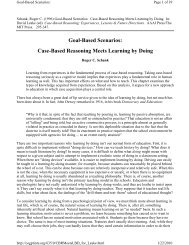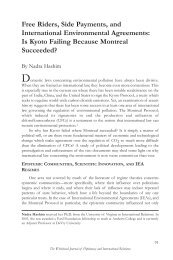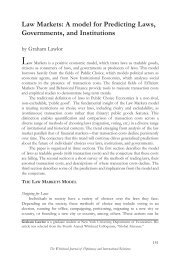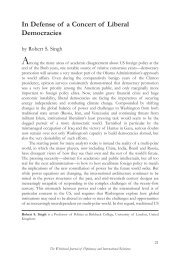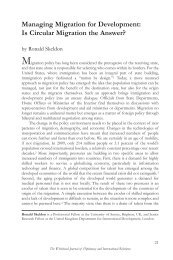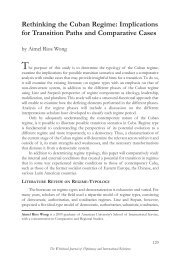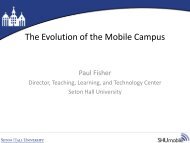Seton Hall Magazine, Winter 2000 - Seton Hall University
Seton Hall Magazine, Winter 2000 - Seton Hall University
Seton Hall Magazine, Winter 2000 - Seton Hall University
You also want an ePaper? Increase the reach of your titles
YUMPU automatically turns print PDFs into web optimized ePapers that Google loves.
H e a l t h C a r e<br />
Trade-offs, Choices and the Struggle for a National Conscience<br />
BY PHIL DISALVIO, ED.D.<br />
Miraculous technological<br />
medical advances,<br />
enormous expansion<br />
of medical capabilities and<br />
extraordinary contributions in<br />
biomedical research will occur in<br />
21st-century America. These<br />
remarkable accomplishments will<br />
follow a century in which advances<br />
in clinical care and public health have<br />
exceeded those advances made in all of<br />
history. The 20th century saw as great an<br />
increase in life expectancy as has taken<br />
place in the previous 19 centuries.<br />
These awesome achievements will<br />
be tempered by a formidable set of<br />
challenges and choices. Confronted by<br />
an array of policy-choice tensions, 21stcentury<br />
America will have to begin to<br />
come to grips with its contradictory<br />
demands on health care. With a public<br />
ambivalent about health care issues —<br />
wanting everything but not necessarily<br />
wanting to pay for it — the emerging<br />
dialectic from a society that is technologically<br />
progressive, but socially regressive,<br />
will intensify.<br />
In the first year of the 21st century,<br />
Americans will spend $1 trillion on health<br />
care. That figure will double by 2010.<br />
The first year of the 21st century will also<br />
reveal that 15 percent of the population<br />
lacks adequate health insurance. The<br />
paradox between robust support for egalitarian<br />
principles and lukewarm support<br />
for universal health insurance will linger.<br />
Those 43 million Americans without<br />
health insurance epitomize the 21st century’s<br />
defining political conflict.<br />
The big question will be how much<br />
the American people will be comfortable<br />
spending to ensure that the technological<br />
marvels of modern medicine are available<br />
and affordable to those who need<br />
them. Will Americans in the 21st century<br />
be willing to share technological<br />
medical progress and put up the<br />
money to pay for it? How much health<br />
care do we want, and how much are<br />
we willing to afford?<br />
16 SETON HALL UNIVERSITY MAGAZINE<br />
“The big question<br />
will be how much<br />
the American<br />
people will be<br />
comfortable<br />
spending to<br />
ensure that the<br />
technological<br />
marvels of<br />
modern medicine<br />
are available<br />
and affordable<br />
to those who<br />
need them.”<br />
To complicate<br />
matters, the<br />
demographics<br />
look ominous.<br />
The great crisis<br />
after 2010 will, in<br />
all likelihood, be<br />
health care for<br />
the elderly. As<br />
the baby boomers<br />
pass into the<br />
elderly ranks,<br />
economic indicators<br />
show that<br />
we will go from<br />
3.9 workers per<br />
elderly person at the beginning of the<br />
century to 2.3 in 2030. Who will pay for<br />
care for the elderly? What will the share<br />
of the health care cost be between the<br />
elderly and the non-elderly? As the<br />
20th century fades into history, there<br />
is no clear consensus in sight on how<br />
to address these questions or even<br />
where to begin.<br />
Financing issues are not the only<br />
dilemmas we will face. Shifts in the<br />
organization and delivery of medical services<br />
into a market-driven economy will<br />
continue to have profound effects on<br />
important stakeholders. Physicians will<br />
increasingly face a real crisis in their<br />
perceptions of what medicine is about.<br />
Disgruntled and uncertain about their<br />
future and how they practice medicine,<br />
physicians will struggle to regain their<br />
powerful voice. At the same time,<br />
mega-mergers of insurance companies,<br />
managed care providers and health care<br />
service organizations will underscore the<br />
transformation of medicine and health<br />
care. In less than a century, health care<br />
will have gone from a cottage industry to<br />
a giant medical-industrial complex dominated<br />
by a few major actors.<br />
Making sound, responsible health<br />
policy choices will not be easy in the<br />
21st century. There will be no simple<br />
answers to guide us. Problems about<br />
health care delivery will not have been<br />
resolved through managed care strategies,<br />
nor will market competition provide<br />
adequate levels of care to everyone<br />
who needs it. A problem-free health care<br />
system is unlikely.<br />
The debate will continue to be<br />
framed around the questions of how to<br />
hold down costs, how to deliver highquality<br />
care to all those in need and how<br />
to allocate the share of the burden.<br />
However, we will not see a radical<br />
restructuring or universal coverage of all<br />
Americans. A more likely scenario will<br />
be incremental changes built upon discrete<br />
focused efforts (e.g., a patient bill<br />
of rights, insurance coverage for uninsured<br />
children, protection for people<br />
changing jobs, etc.). Twenty-first century<br />
health care will be based upon the set<br />
of problems we choose to live with.<br />
Trading off those problems that are<br />
acceptable and those solutions that are<br />
palatable will be emblematic. While<br />
health care and medical technology<br />
advances will astonish us in the 21st<br />
century, the structure and process of<br />
American health care will evolve much<br />
like a patchwork quilt — mending<br />
problems as they become politically<br />
intolerable and relenting to piecemeal<br />
changes when the solutions are politically<br />
supportable.<br />
Phil DiSalvio, Ed.D., is the<br />
academic director for graduate<br />
programs in health care administration<br />
in the Center for<br />
Public Service.




